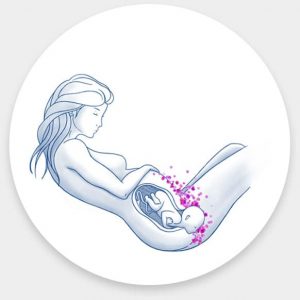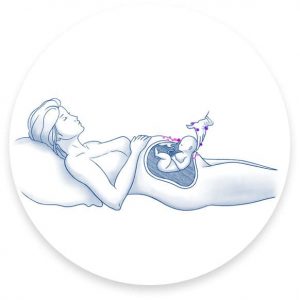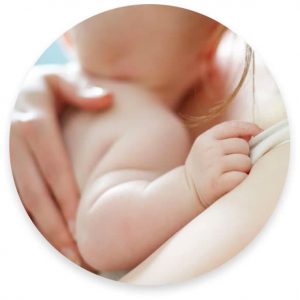Why is breastfeeding so important for a baby born by cesarean?
Natural delivery provides major benefits to the baby. Whereas a caesarean section can weaken a child’s defence system. Breastfeeding is the ideal feeding method to remedy this and help your child build up its natural defences! Find out all the benefits of breast milk!
What are the characteristics of a baby born by caesarean section?1-3
Throughout pregnancy, the baby develops in a sterile environment. At birth, it has its first contact with the outside world, and in particular the bacteria within it. These bacteria are essential to the proper development of the infant’s natural defences.
A baby born by vaginal delivery is brought into direct contact with maternal bacteria. The transmission of this bacteria strengthens its immune system.

A child born by caesarean section is delivered through the mother’s stomach, not her vagina. As a result, it does not come into contact with the mother’s microbiota, but with bacteria from the outside world. These bacteria are fewer and less adapted to the needs of the baby. The development of its intestinal flora is therefore delayed, meaning its defence system may be more “sensitive”.
Breast milk: the ideal diet for a baby born by caesarean section4
Rest assured! Having a caesarean section does not in any way have a definitive effect on your child’s immune system. To help your child build it up properly, breastfeeding remains the best diet…
Is it possible to breastfeed after a caesarean section?8
The World Health Organization (WHO) recommends that infants be exclusively breastfed for the first six months. Thereafter, infants should receive a diversified diet alongside continued breastfeeding up to two years of age. Birth by caesarean section is in no way an obstacle to breastfeeding and can be put in place following the operation. To do so, be sure to notify the medical team of your desire to breastfeed, before the procedure if possible.

How can breast milk strengthen the baby’s immune system?5, 6
Breast milk contains probiotics (beneficial live bacteria) and prebiotics (non-digestible fibres that are useful to the beneficial bacteria of the baby’s intestinal flora). Both act to reinforce the intestinal flora and natural defences of the child; sometimes somewhat altered by the caesarean delivery.
As a result, a baby born by caesarean section can benefit from the mother’s “good” bacteria, just like a baby born by vaginal delivery. Its defence system will be operational faster.
Not only is it a special moment to share with your child, breastfeeding is also the best possible source of food. Breast milk offers: hydration, vitamins, mineral salts, trace elements, sugars, fats, and other proteins that are essential for a baby’s healthy development; and all this in appropriate quantities as its composition adapts to your child’s needs.

TIP: Facilitating the transmission of elements that are beneficial to a newborn’s health7?
Contact between your baby and your skin, in particular your breast, contributes to the transmission of microorganisms that promote optimal growth. Skin-to-skin contact should therefore be practised from your baby’s arrival.BA20-246
- Worepeis H., et al, The first thousand days – intestinal microbiology of early life: establishing a symbiosis, Pediatr Allergy Immunol, 2014; 25: 428-38.
- Butel MJ, et al. The developing gut microbiota and its consequences for health. J Dev Orig Health Dis. 2018; 22: 1-8
- Tanaka et al., Development of the gut microbiota in infancy and its impact on health in later life. Allergology International. 66 (2017) 515-522
- HMR Golden Messages, Nutricia Research, 2018; https://www.nutriciaresearch.com/
- Jeurink PV. Et al., Human milk: a source of more life than we imagine. Benef Microbes. 2013; 4: 17-30
- Ballard O, et al., Human milk composition: nutrients and bioactive factors. Pediatr Clin North Am 2013; 60: 49-74
- Moore E., et al., Early skin-to-skin contact for mothers and their healthy newborn infants, Cochrane Database Syst Rev. Author manuscript; available in PMC 2014 April 08.
- World Health Organization https://www.who.int/topics/breastfeeding/en/
Further Reading

How to successfully breastfeed after a cesarean?
Cesarean section scheduled or not, the operation is not a trivial act. If it can cause fatigue and discomfort in the days following childbirth, it should in no way be an obstacle to your desire to breastfeed.
Read More

Feeding Choices
When it comes to making feeding decisions, try to talk all the options through as a couple, and be supportive of your partner’s wishes – even if these change after birth.
Read More



